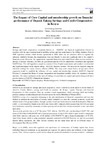| dc.description.abstract | Savings and Credit cooperatives commonly known as SACCOs’ are financial organizations formed by members with the same common bond to mobilize savings and later grant loans to the willing members. Prior to 2008 regulatory reforms which became operational in 2010, there was no conscious effort to regulate the subsector prudently because the organizations were not thought to pose any significant risk to the country’s financial system. However, the organizations expanded financially and started Front office services activity in attempt to increase efficiency. In 2008, the government and the SACCO stakeholders formulated and legislated SACCO laws. The null hypotheses sought to examine if Core Capital requirements and members retention had any significant impact on the deposit taking SACCOs’ financial incomes. The data was the analysed using the statistical package for social sciences software (SPSS). The study used census Survey design and a linear regression model to establish the influence of core capital and membership retention SACCO’s financial Position. It compared the Betas of various independent and dependent variables before the regulatory reforms and after. The study conclusions on the basis of findings revealed that core capital and membership growth have positive impact on SACCO’s financial performance. | en_US |

